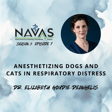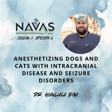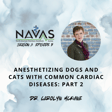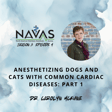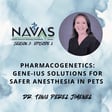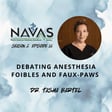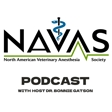
Dr. Erik Hofmeister: Building Skills and Confidence Through Anesthesia Education
Are you someone who doesn’t feel confident in your anesthesia skills or knowledge?
Are you seeking resources beyond this podcast to improve your anesthesia expertise?
Veterinary professionals often find themselves crunched for time, so finding resources that will guarantee rapid results in training is crucial to advancing anesthesia knowledge. How can we integrate effective training modalities into veterinary practice that will provide meaningful educational opportunities, improve skill levels, and heighten overall job satisfaction?
With so many options out there for continuing education, how can you effectively evaluate training programs to know what educational resources to use that will produce the most meaningful results for you?
In this episode, we talk with Dr. Erik Hofmeister, a professor of veterinary anesthesia at Auburn School of Veterinary Medicine with over 20 years of experience teaching veterinary students. With his guidance, we will discuss what causes individuals to lack confidence in their anesthesia skills, evidence-based recommendations for effectively learning skill sets related to anesthesia, and how to appraise existing anesthesia training programs to ensure that you get a fulfilling education experience.
Resources mentioned in today’s episode:
Read 2023 AAHA Technician Utilization Guidelines or watch a quick summary of these guidelines.
Understanding How We Learn: A Visual Guide
If you are creating an anesthesia training program, consider reviewing the book Understanding by Design recommended by Dr. Hofmeister
Not mentioned in today’s episode, but we encourage listeners to review Dr. Hofmeister’s and Dr. Love’s JAVMA article on patient safety culture in veterinary medicine (Open Access).
If you are looking for more information on veterinary education, please check out Dr. Hofmeister’s podcast, Reflections in Veterinary Education (RIVE), and his blog The Vetducator - Help for every stage of your veterinary career.
As a reminder, the NAVAS Virtual Spring Symposium is taking place next month on April 27th and 28th. Registration is free!
If you like what you hear, we have a couple of favors to ask of you:
Become a member of NAVAS for access to more anesthesia and analgesia educational and RACE-approved CE content.
Spread the word. Share our podcast on your socials or a discussion forum. That would really help us achieve our mission: Reduce mortality and morbidity in veterinary patients undergoing sedation, anesthesia, and analgesia through high-quality, peer-reviewed education.
Thank you to our sponsor, Dechra - learn more about the pharmaceutical products Dechra has to offer veterinary professionals, such as Zenalpha.
If you have questions about this episode or want to suggest topics for future episodes, reach out to the producers at education@mynavas.org.
All opinions stated by the host and their guests are theirs alone and do not represent the thoughts or opinions of any corporation, university, or other business or governmental entity.
The NAVAS Podcast is published monthly on or near the 15th of the month.
Special thanks to Chris Webster for editing, producer Maria Bridges, and Saul Jimenez for IT support in making this podcast a reality.
